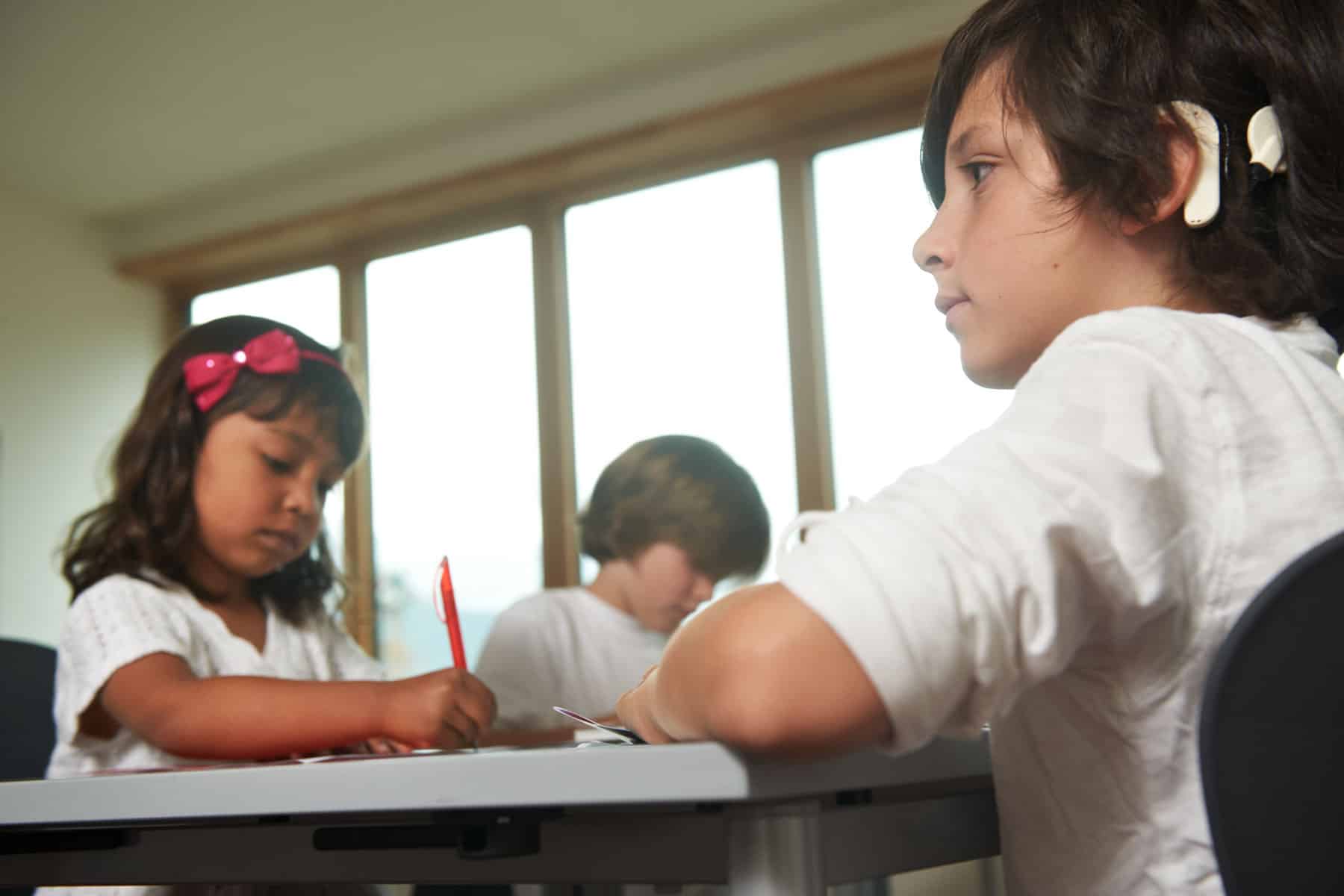MED-EL
Published Jan 23, 2015 | Last Update Mar 15, 2023
Your Child with a Cochlear Implant in a Mainstream School

If your child has a cochlear implant, you might be weighing a few different options when it comes to which school he or she will attend. One of these options is a “mainstream school”: your standard local school filled with all sorts of different kids, both with and without hearing losses.
If you’re considering having your child attend a mainstream school, it’s important that you know your child is ready for a mainstream school. How can you do this? A good way is by building their school readiness skills, the skills that help your child to independently function throughout the day. Having a good foundation built on solid school readiness skills means that your child will be able to get along well in and out of the classroom.
These skills cover:
- Communication skills
- Social and emotional skills
- Phonological awareness and early literacy skills
- Fine motor skills
Here’s how you can help evaluate and build your child’s school readiness skills:
Communication Skills
Communication skills are your child’s ability to use and understand a wide vocabulary, follow directions, respond to questions, ask questions, seek support when they are having difficulty completing a task, and retell an event or story.
You can help your child cochlear implant recipient develop his or her communication skills by:
- Familiarizing them with the words and typical phrases that they’ll hear during the school day, like “desk”, “pencil”, “classroom”, “stand in line”, and “put your hand up”, so that they don’t have to guess what the teacher is saying or meaning.
- Helping your child to respond to, and ask, questions by playing games like “Go Fish” and “Guess Who?”
- Encouraging your child to ask for help using specific statements and vocabulary. For example if your child needs help tying his or her shoelaces, have them ask “Can you help me tie my shoelaces?” instead of saying generally “I need help”.
- Encourage your child to talk about their day and go through the events or experiences they had. This will help your child to develop skills in organizing their thoughts sequentially and communicating clear stories.
Social and Emotional Skills
Social and emotional skills are measures of your child’s social and emotional maturity.
You can help develop your child’s social and emotional skills by:
- Teaching your child how to take turns. You can do this by playing almost any game, and use specific language to identify whose turn it is and how each person gets their own turn.
- Helping them understand emotions:
- Talk about how others experience feelings and emotions, for example by saying “I’m going to share my candy with Nicole because she doesn’t have any and it might make her happy.”
- Use books as a way to give examples of different people and situations. Describe the emotions that characters might be feeling, and then explain the possible causes or consequences of these emotions. For example, “Peter looks like he’s sad. Why do you think he might be feeling sad? It might be because he fell down and hurt his knee.”
- Ask your child to think about others’ emotions with direct questions like “How do you think Anna might feel if we don’t share the toys with her?”
- Encouraging your child to act independently. Instead of telling them what to do each day, teach your child things like how to wash their hands, blow their nose, open and close their school bag, adjust their clothing, or handle food. Especially for children with a cochlear implant, make sure that they can indicate and explain to their teacher things like if their hearing device batteries need changing or if they are having trouble hearing.
Phonological Awareness and Early Literacy Skills
Although your child probably won’t be expected to read or write before the first year of school, demonstrating how text conveys messages can provide a foundation for your child to build on in school.
You can help develop your child’s phonological awareness and early literacy skills by:
- Reading rhyme books with your child, highlighting the rhyming words so that your child can develop an understanding of how some words sound the same or rhyme and learn about the sound system of spoken language.
- Letting your child try to read a picture book to you. He or she might not read the exact words, but encourage them to use the pictures on each page as cues to the general plot.
- Using your finger to point at the words as you read them, which will help your child to learn the direction a text is printed (Western languages are usually printed left-to-right, for example).
- Identifying letters and numbers as you go about day-to-day activities, like when you’re reading or going shopping, by finding written letters and numbers on different signs or labels, and teaching your child which sound goes with each symbol.
- Teaching your child the letters in their name, and in the names of family members. An easy way to start this is by labeling different items around the house with the name of the owner, and then teaching your child to identify whose name is written on a specific label.
- Counting items during your daily routines, like the number of steps you take or how many cups there are on the dinner table.
- Encouraging your child to hold a pencil to draw or play-write with it, or having them hold the pencil as you write something.
Fine Motor Skills
Fine motor skills are your child’s foundation for moving around the world, and include holding a pencil effectively, tying shoelaces, buttoning and zipping clothing, and using scissors.
You can help develop your child’s fine motor skills by:
- Letting them put on their own clothing, and encouraging them to button, zip, and tie each piece.
- Encouraging them to place their own hearing devices on independently each day, ensuring they are in place to hear optimally. This is especially important as your child heads off to school because he or she might need to put their devices back on if they fall off in the classroom or playground, when a teacher or adult isn’t close by or able to help.
- Giving your child paper, scissors, and glue, and letting them freely practice. If your child is very young, using blunt scissors and Playdough is a good way to make sure they’re learning safely.
- Encouraging your child to use forks, knives, and spoons from an early age.
- Having your child unwrap or peel their own food, instead of doing it for them.
- Encouraging your child to brush their own teeth and comb their hair.
Did you send your child with a cochlear implant to a mainstream school? What tips would you give to other parents considering it?
This post was written with help from Ingrid Steyns, a rehabilitation specialist at MED-EL.
MED-EL
Was this article helpful?
Thanks for your feedback.
Sign up for newsletter below for more.
Thanks for your feedback.
Please leave your message below.
Thanks for your message. We will reply as soon as possible.
Send us a message
Field is required
John Doe
Field is required
name@mail.com
Field is required
What do you think?
MED-EL


